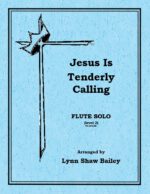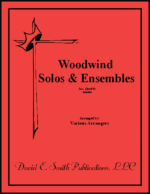| Instrument | |
|---|---|
| Level | 6 |
| Occasion | |
| Theme | Glory To His Name |
| Writer | |
| Publisher |

Glory To His Name
$4.00
Related products
-
Like A River Glorious
$4.50This is a flute solo that begins in a flowing manner and quickly accelerates to a more technical rendition of the tune creating a delightful atmosphere of this grand old hymn. It is effervescent and uplifting.
-
Jesus Is Tenderly Calling
$4.00An accompanied flute solo which begins with a piano introduction and then presents a modified melody with an extended cadence in the piano. A modulation occurs where the solo line presents a new theme built off from the orinigal theme with another modulation lifting the tonality to a higher reference and then ends with a solemn motive.
-
-
O The Deep Deep Love Of Jesus
$4.50This piece would serve well as a meditation. Beginning with a quiet Celtic lilt, the center section is stronger and bolder. After several bell effects, the piece returns to the mood of the beginning.
-
How Beautiful Are The Feet
$4.00Taken from the “Messiah”, this solo with piano is essentially a transcription of the original work. The balance in the writing between the solo and the accompaniment gives way to the sensitivity of the text of this well-know aria..
-
What Child Is This?
$4.00This flute solo begins with the piano playing a gentle motif of the theme and then joined in with the solo line playing the theme in a straight forward fashion. The theme is now stated in a modified manner while the soloist exudes a moving obbligato line which adds more excitement to the piece. The piece concludes with the latter section of the first section and then settles into a solemn repose.
-
Are You Washed In The Blood
$5.00This solo is technically demanding while depicting the content of its title. While it is a provocative title with soul-searching implications, the results of its message produces a great deal of joy- salvation! The themes and embellishments presented here certainly enhances the joyous conclusion of such a concept and then moves to a rather solemn reflection of the wonder of it all.








